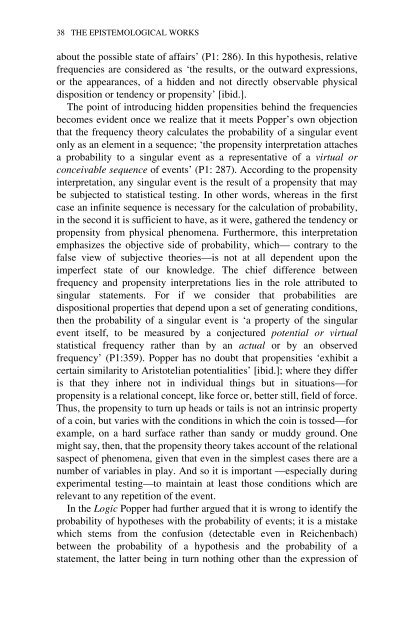20101108131129231
20101108131129231
20101108131129231
You also want an ePaper? Increase the reach of your titles
YUMPU automatically turns print PDFs into web optimized ePapers that Google loves.
38 THE EPISTEMOLOGICAL WORKSabout the possible state of affairs’ (P1: 286). In this hypothesis, relativefrequencies are considered as ‘the results, or the outward expressions,or the appearances, of a hidden and not directly observable physicaldisposition or tendency or propensity’ [ibid.].The point of introducing hidden propensities behind the frequenciesbecomes evident once we realize that it meets Popper’s own objectionthat the frequency theory calculates the probability of a singular eventonly as an element in a sequence; ‘the propensity interpretation attachesa probability to a singular event as a representative of a virtual orconceivable sequence of events’ (P1: 287). According to the propensityinterpretation, any singular event is the result of a propensity that maybe subjected to statistical testing. In other words, whereas in the firstcase an infinite sequence is necessary for the calculation of probability,in the second it is sufficient to have, as it were, gathered the tendency orpropensity from physical phenomena. Furthermore, this interpretationemphasizes the objective side of probability, which— contrary to thefalse view of subjective theories—is not at all dependent upon theimperfect state of our knowledge. The chief difference betweenfrequency and propensity interpretations lies in the role attributed tosingular statements. For if we consider that probabilities aredispositional properties that depend upon a set of generating conditions,then the probability of a singular event is ‘a property of the singularevent itself, to be measured by a conjectured potential or virtualstatistical frequency rather than by an actual or by an observedfrequency’ (P1:359). Popper has no doubt that propensities ‘exhibit acertain similarity to Aristotelian potentialities’ [ibid.]; where they differis that they inhere not in individual things but in situations—forpropensity is a relational concept, like force or, better still, field of force.Thus, the propensity to turn up heads or tails is not an intrinsic propertyof a coin, but varies with the conditions in which the coin is tossed—forexample, on a hard surface rather than sandy or muddy ground. Onemight say, then, that the propensity theory takes account of the relationalsaspect of phenomena, given that even in the simplest cases there are anumber of variables in play. And so it is important —especially duringexperimental testing—to maintain at least those conditions which arerelevant to any repetition of the event.In the Logic Popper had further argued that it is wrong to identify theprobability of hypotheses with the probability of events; it is a mistakewhich stems from the confusion (detectable even in Reichenbach)between the probability of a hypothesis and the probability of astatement, the latter being in turn nothing other than the expression of


